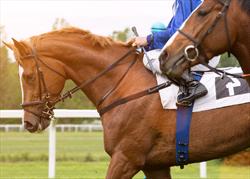Bob Judd, DVM, DABVP (Equine Medicine), DABVP (Canine and Feline Practice)
Racehorses

Many animals, including horses, are susceptible to the COVID-19 virus but generally do not get sick.
Dr. Pusterla, DVM, Ph.D., DACVIM, DAVDC-Equine, from UC Davis, said at the AAEP convention that a small percentage of healthy racehorses recently tested positive for COVID-19 following a human COVID-19 outbreak in California.
This suggests that horses may silently carry the virus and potentially contribute to its spread.
There is some concern that the virus could suddenly adapt to a different species and then bounce back to people. Horses do have a spike protein receptor that is like the one in humans, which suggests they might also be able to get and transmit the virus. Spike proteins allow viruses to enter host cells and cause infection.
Dr. Pusterla ran measurable PCR tests (a test used to detect materials in a virus, in this case, COVID-19) on nasal secretions from 667 horses experiencing acute onset of fever and respiratory signs in January 2019 and December 2020. The samples were also tested for other infectious upper respiratory viruses and bacteria, including influenza, herpesvirus, rhinitis viruses, and Streptococcus equi (strangles).
They also tested 587 horses at Del Mar racetrack in California in the summer of 2020 and found one common equine pathogen in about one-third of the sick horses tested. However, none of the sick horses tested positive for COVID-19, but 6% of the healthy thoroughbreds tested positive for the virus.
Another 1100 horses were presented to the teaching hospital at UC Davis and were tested. It was found that 3.5% tested positive for COVID-19, and it is believed the exposure was from humans with or without active COVID-19 infections. Dr. Pusterla also says the virus will likely become more contagious and could cause disease in horses in the future, so the disease will continue to be monitored in horses.
Be sure to bring any questions or concerns you have about COVID-19 possibly infecting your horses to your veterinarian.